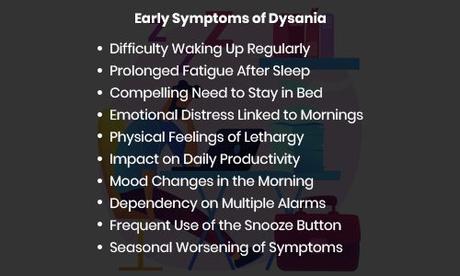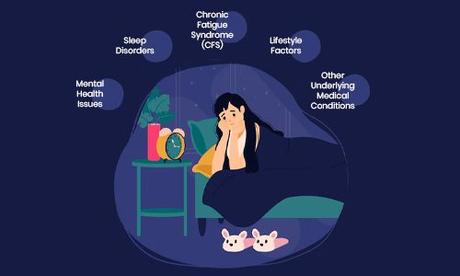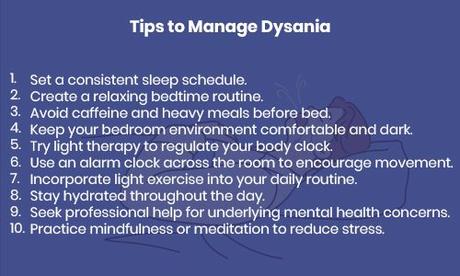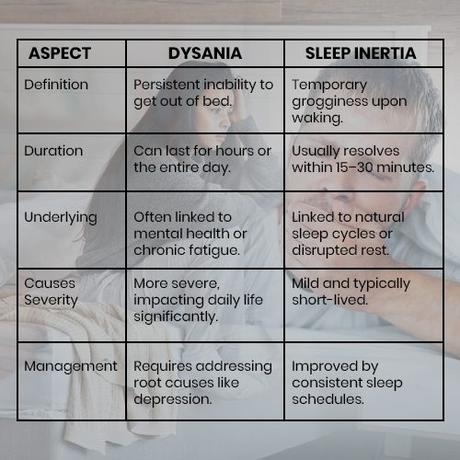Feeling tired is a natural part of life-it might happen after a long day, a restless night, or physical exertion. However, dysania goes beyond occasional fatigue . It's not just, "I don't feel like getting up;" it's an intense, almost immobilizing inability to leave the comfort of your bed, even when responsibilities or activities await. This often leaves people asking, "Why is it so hard to wake up?"
For individuals with dysania, the struggle isn't simply a lack of motivation or energy-it's a deeply rooted difficulty tied to underlying physical or mental health conditions . This sensation can feel insurmountable, as though a heavy weight keeps you tethered to the bed, regardless of how much you need or want to rise.
How Is Dysania Different from Being Tired?

Dysania isn't just about hitting the snooze button repeatedly. It's a chronic difficulty getting out of bed, even when you've had enough sleep. While it's not a recognized medical condition, it's often linked to underlying issues like depression, anxiety, or chronic fatigue.
Dysania isn't about laziness or lack of willpower. It's often tied to deeper issues, such as mental health conditions like depression, where the emotional toll makes waking up feel overwhelming, or physical health concerns like chronic fatigue syndrome, which leaves the body perpetually drained. Unlike ordinary tiredness , which usually resolves with rest or recovery, Dysania can persist for days, weeks, or even longer, regardless of how much sleep you get. It's this persistent nature, the question of "why waking up feels so difficult," and its emotional weight that set Dysania apart.
What Are the Early Symptoms of Dysania?

Possible Causes of Dysania

Understanding what causes it can shed light on why it feels so overwhelming. While the reasons vary from person to person, several common factors can contribute to this condition:
1. Mental Health Issues
Dysania is often linked to mental health challenges, such as depression or anxiety. Depression can create a deep sense of hopelessness and exhaustion, making even the thought of getting out of bed seem insurmountable. Anxiety, on the other hand, may result in restless sleep or a feeling of being mentally and physically drained before the day even begins.
2. Sleep Disorders
Conditions like sleep apnea , where breathing repeatedly stops during sleep, or , which prevents restful sleep, can leave you waking up feeling as if you didn't rest at all. When your body doesn't get the restorative sleep it needs, mornings can feel like an uphill battle.
3. Chronic Fatigue Syndrome (CFS)
Chronic fatigue syndrome is characterized by extreme, persistent tiredness that isn't relieved by sleep. With CFS, waking up can feel like trying to move through molasses, and this sensation can persist throughout the day, exacerbating the symptoms.
4. Lifestyle Factors
Unhealthy lifestyle choices can play a role in dysania:
- Poor Diet - A lack of nutrients or overconsumption of processed foods can sap your energy.
- Irregular Sleep Schedules - Staying up late, inconsistent bedtime routines or oversleeping can disrupt your body's natural rhythm.
- Lack of Exercise - Physical inactivity can lead to lower energy levels and poor overall well-being, making it harder to start the day.
5. Other Underlying Medical Conditions
Conditions like hypothyroidism, , or chronic pain disorders can also contribute to dysania. These illnesses often cause fatigue and low energy, making it feel impossible to face the day ahead.
By identifying and addressing these potential causes, it's possible to develop strategies to manage it and improve your overall quality of life.
Does Dysania Affect Everyone?
No, it doesn't affect everyone. While most people experience difficulty waking up occasionally, dysania is much more intense and often linked to underlying mental or physical health conditions. It's not about simply feeling groggy; it's about a persistent inability to leave the bed, often despite adequate rest. Those dealing with depression, chronic fatigue, or sleep disorders are more likely to experience it, but it's not universal.
How Can Dysania Impact Your Life?
It can seep into every aspect of life, creating challenges that extend far beyond mornings. Here's how it can impact you:
a) Work and School
Struggling to get out of bed can lead to tardiness, absenteeism, or even difficulty maintaining a job or academic performance.
b) Social Life
A lack of energy or motivation may make social activities feel exhausting, leading to isolation.
c) Mental Health
The guilt and frustration of not meeting daily responsibilities can exacerbate feelings of anxiety or depression.
d) Physical Health
Reduced physical activity and irregular routines can negatively affect overall health, potentially worsening fatigue.
Tips to Manage Dysania

Dysania vs. Sleep Inertia: What's the Difference?

The Importance of Self-Compassion

Living with this condition can feel frustrating, especially when it impacts daily responsibilities. However, self-compassion is key. Recognize that it isn't about laziness or lack of willpower-it's a legitimate struggle often tied to health issues. Practice kindness toward yourself by celebrating small victories, whether it's getting out of bed or seeking help. Remember, it's okay to take things one step at a time.
Can Lifestyle Changes Help with Dysania?
Lifestyle changes can significantly reduce its symptoms. Adjusting daily habits can help your body regain balance and promote better rest.
- Establishing a regular sleep schedule to maintain a healthy circadian rhythm.
- Prioritizing physical activity, even light exercise, to boost energy levels.
- Reducing screen time before bed to minimize sleep disruptions.
- Improving your diet to include more whole foods and avoid energy crashes.
- Setting realistic daily goals to reduce overwhelming feelings.
By taking small, manageable steps, you can work toward a routine that supports your well-being and makes mornings less daunting.
How Diet and Nutrition Influence Dysania Symptoms?

The foods we eat play a significant role in our overall energy levels and sleep quality. Here's how poor dietary choices can exacerbate feelings of fatigue and lethargy, while balanced nutrition can help improve alertness and combat dysania.
a. Blood Sugar Stability
Diets high in refined sugars and carbohydrates can cause blood sugar spikes, followed by crashes, leading to fatigue. Incorporating whole grains, lean proteins, and healthy fats helps maintain steady energy levels.
b. Nutrient Deficiencies
A lack of essential nutrients like iron, , and B vitamins can contribute to fatigue. Iron deficiency, for example, can lead to anemia, a common cause of persistent tiredness.
c. Hydration
Even mild dehydration can result in lethargy and difficulty concentrating. Drinking enough water throughout the day supports physical and mental alertness.
d. Caffeine Overuse
While coffee or tea may provide a temporary boost, excessive caffeine can interfere with your sleep quality, making dysania worse. Moderation is key.
e. Timing of Meals
Eating heavy meals late at night can disrupt your sleep cycle, leaving you feeling groggy in the morning. Opt for lighter, nutrient-rich dinners and consider a small snack like a banana or nuts before bed.
Dysania in Different Age Groups: Does It Affect Everyone the Same Way?
It can manifest differently depending on an individual's age, as the challenges and contributing factors vary across life stages.
1. Children and Adolescents
For younger individuals, it is often linked to irregular sleep schedules, school stress, or technology use before bed. The natural shift in teens' circadian rhythms (sleep patterns) can also make mornings particularly difficult.
2. Young Adults
Stress from college, careers, and social commitments can disrupt sleep and lead to dysania. Additionally, lifestyle habits like late-night studying, poor diet, or excessive screen time contribute to symptoms.
3. Middle-Aged Adults
It often stems from chronic stress, demanding work schedules, or health issues like sleep apnea or hormonal changes.
4. Older Adults
In seniors, dysania may result from underlying health conditions, such as arthritis, depression, or disrupted sleep due to medications or chronic pain.
Dysania might feel overwhelming, but you're not alone. With small lifestyle changes, professional support, and a bit of patience, better mornings are within reach. Remember, every step you take toward understanding and managing dysania is a step toward a healthier, more fulfilling life.

I'm Vannessa, a certified masters in curating unique diet plans specializing in nutrition, weight management, stress management etc. I was formerly a member of Healthline's dedicated research team and was recognized as one of their top writers for a decade.I am also actively participating in several health forums, including MomMD and MedHelp.I'm passionate about helping people achieve optimal health through strength training, mindfulness techniques. My articles and guides offer a blend of research and practical strategies to support your specific needs. Let's work together to unlock your full potential for a healthier life.I postgraduated my degree in Advanced Food Safety from Queen's University Belfast. (https://www.qub.ac.uk/)

